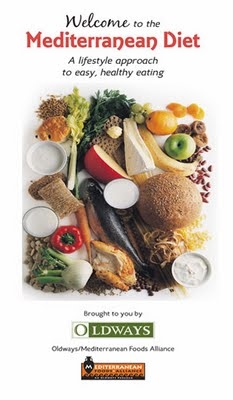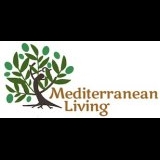National Mediterranean Diet Month on May, 2024: Does anybody know about Modern day Egypt?
May, 2024 is National Mediterranean Diet Month 2024.
As an Amazon Associate I earn from qualifying purchases.

Egyptian cuisine consists of local culinary traditions such as Ful Medames, Kushari and Molokhia, while sharing similarities with food found throughout the eastern Mediterranean like kebab and falafel.
Most Egyptians perhaps consider ful medames, or mashed fava beans, to be the national dish. Ful is also used in making Ta'miyya or Falafel (Arabic: طعمية – فلافل). Bread accompanies most Egyptian meals; local bread is called Eish Masri or Eish Baladi (Egyptian Arabic: عيش), a word which also means life.
Ancient Egyptians are known to have used a lot of garlic and onion in their everyday dishes. Fresh mashed garlic with other herbs is used in spicy tomato salad and is also stuffed in boiled or baked aubergines (eggplant). Garlic fried with coriander is added to Mulukhiyya (Arabic: ملوخية), a popular green soup made from finely chopped leaves. Fried onions are added to Kushari (Arabic: كشري), a dish consisting of brown lentils, macaroni, rice, chickpeas and a spicy tomato sauce.
Other popular dishes include Kebab and Kofta (Arabic: كباب وكفتة), usually of lamb meat, chops & minced meat on skewers grilled on charcoal. Egyptians are famous for stuffing spicy rice in vegetables like green pepper, aubergines, courgettes and tomatoes to make Mahshi (Arabic: محشي). Mahshi is generally rolled in grapevine leaves, Mahshi Warraq Enab (Arabic: محشي ورق عنب), or in cabbage leaves, Mahshi Koronb (Arabic: محشي كرنب). Shawerma (Arabic: شاورمة) is a popular sandwich of shreded meat or chicken, usually rolled in pita bread with Tahina sauce.
Although Ramadan is a month of fasting in Egypt, it is usually when Egyptians pay special attention to food in variety and richness, since the whole family would gather on the breakfast table just after sunset. There are several special desserts almost exclusive to Ramadan such as Konafa and Atayef (Arabic: كنافة وقطايف). In this month, many Egyptians will make a special table for the poor or passers-by, usually in a tent in the street, called Ma'edat Al Rahman (Arabic: مائدة الرحمن) which translates literally as Table of (God) the Gracious (Merciful).
Christians of Egypt, mainly Copts, observe fasting periods according to the Liturgical Calendar that practically extend to more than two-thirds of the year. The diet is mainly vegetarian. During this fasting, Copts will usually eat vegetables fried in oil as they avoid meat, chicken, dairy products including butter.
Egyptian food reflects the country's melting-pot history; native cooks using local ingredients have modified Greek, Turkish, Lebanese, Palestinian, and Syrian traditions to suit Egyptian budgets, customs, and tastes. The dishes are simple; made with naturally ripened fruits and vegetables and seasoned with fresh spices. The ancient Egyptian's diet consisted of a vast amount of grains, fish, vegetables, and fruits. grain offered an endless supply of food to the ancient Egyptians and could be stored with little spoiling. Fruits and vegetables were also a major part of the Egyptian's diet. Fish, just like grain, was a part of most Egyptian's daily diet. Eating fish was shunned by some of the upper class Egyptians, but it was popular with the masses. Meat (from land herds) was eaten by the common people only on special occasions because of the high price and scarceness of cattle. Honey was a great addition to the Egyptians diet, used for many different applications. It was commonly used as a substitute for sugar.
Egypt is a culinary adventure. The variety of Egyptian recipes is extensive, and utilizes many types of food. rice and bread form the bulk of Egyptian main courses, which may be served either as lunch or dinner. Egyptian cuisine is known for flavor and its use of fresh ingredients. The staple in every Arab's diet is a bread called aish (means life). For most Egyptians, meat is a luxury used in small amounts, cooked with vegetables and served with or over rice. Fava beans are also important in the diet. An Egyptian course would consist of soup, meat, vegetable stew, bread, salad and rice or pasta. Desserts consist of mostly fruit and sometimes pastry or puddings which can be drenched in honey as well as baklava (filo dough, honey, and nuts).
The variety of Egyptian recipes is endless. They go back a very long way. As a result of subsequent colonization, foreign influence is somewhat present, specially from the Turkish cuisine (it is understandable after more than 300 years of Turkish presence in Egypt). The "Pashas" living in Cairo mainly employed the natives as help and cooks. Their kitchen doors opened to us with their culinary secrets and, hence, Turkish food became part of ours.
Recipes gathered here are those known to the common Egyptian ,irrelevant of their origin. Their names in Arabic are the ones we all know and use. Ingredients used are very easily found in Middle East/Oriental specialty stores.
Ancient Egyptian Food and Drink The Egyptians were very secure in that the Nile valley always yielded enough to feed the country, even when famine was present in other nearby parts of the world. The Egyptian's basic food and drink, bread and beer, were made from the main crops they grew, wheat and barely. There were many types of bread ,including pastries and cakes. Since there was no sugar, honey was used as a sweetener by the rich, and poor people used dates and fruit juices. Egyptians liked strong-tasting vegetables such as garlic and onions.
They thought these were good for the health. They also ate peas and beans ,lettuce, cucumbers, and leeks. Vegetables were often served with an oil and vinegar dressing. Figs, dates, pomegranates and grapes were the only fruits that could be grown in the hot climate. The rich could afford to make wine from their grapes.
Ordinary people ate fish and poultry. On special occasions they ate sheep, goat, or pig; but there was little grazing land available so meat was expensive and most people ate it only on festive occasions.
Egyptians stored their food in jars and granaries. Fish and meat had to be especially prepared for storage. One method was salting. Another was to hang up the fish in the sun, which baked them dry.
In ordinary families the cooking was done by the housewife, but larger households employed servants to work in the kitchen and a chef - usually a man - to do the cooking. The Egyptians had ovens, and knew how to boil roast, and fry food. There were few kitchen tools: pestles, mortars, and sieves.

Are cashew nuts the least fattening of all peanuts?
1. Walnuts
When it comes to nuts, the walnut is the king. It's a great source of the healthy omega-3 essential fatty acids, which have been found to protect the heart, promote better cognitive function, and provide anti-inflammatory benefits for asthma, rheumatoid arthritis, eczema and psoriasis.
Walnuts also contain the antioxidant compound ellagic acid, which is known to fight cancer and support the immune system. But that's not all--in a study in the August 2003 issue of Phytochemistry, researchers identified 16 polyphenols in walnuts, including three new tannins, with antioxidant activity so powerful they described it as "remarkable."
Walnuts are incredibly healthy for the heart. A study in the April 2004 issue of Circulation found that when walnuts were substituted for about one-third of the calories supplied by olives and other monounsaturated fats in the Mediterranean diet:
Total cholesterol and LDL (bad) cholesterol were reduced
The elasticity of the arteries increased by 64 percent
Levels of vascular cell adhesion molecules, which play a major role in the development of atherosclerosis (hardening of the arteries), were reduced
2. Almonds
Just a quarter cup of almonds contains nearly 25 percent of your needed daily value of the important nutrient magnesium, plus is rich in potassium, manganese, copper, the antioxidants vitamin E and selenium, and calcium. In fact, a quarter cup of almonds has almost as much calcium as a quarter cup of milk.
They're also great for the colon. An animal study on the effects of almonds on colon cancer found that animals (which were exposed to a colon-cancer-causing agent) given whole almonds had fewer signs of colon cancer than animals given almond oil or no almonds. Researchers suspect the benefit may be due to almonds' high fiber content.
Plus, almonds are one of the best nuts for lowering cholesterol because 70 percent of the fat they contain is the healthy monounsaturated variety, which has been shown to help clear arteries.
3. Cashews
Cashews are lower in fat than most nuts, and 65 percent of this fat is unsaturated fatty acids. Of this, 90 percent is oleic acid, the heart-healthy fat found in olive oil.
Plus, cashews are rich in copper, magnesium, zinc, iron and biotin.
4. Pecans
Pecans are an excellent source of over 19 vitamins and minerals including vitamins E and A, folic acid, calcium, magnesium, copper, phosphorus, potassium, manganese, several B vitamins and zinc.
Plus, according to Sue Taylor, R.D., director of nutrition communication for the National Pecan Shellers Association, "Recent clinical research studies evaluating the impact of pecans on serum cholesterol have found pecans can significantly help lower blood cholesterol when consumed as part of a heart-healthy diet."
In fact, a study from New Mexico State University found that eating 3/4 cup of pecans a day may significantly lower LDL (bad) cholesterol and help to clear the arteries.
5. Brazil Nuts
These nuts are extremely nutrient-rich and contain protein, copper, niacin, magnesium, fiber, vitamin E and selenium. Selenium is a powerful antioxidant that works to neutralize dangerous free radicals. A study at the University of Illinois even found that the high amounts of selenium in Brazil nuts may help prevent breast cancer.
6. Macadamia Nuts
These nuts are high in protein, fiber, healthy monounsaturated fats, potassium and magnesium. And, a study done at Hawaii University found that people who had added macadamia nuts to their diets for just one month had total cholesterol levels of 191, compared to 201 for those eating the typical American diet. The largest change was found in the LDL (bad) cholesterol.

I've heard that nuts are healthy, but which ones?
1. Walnuts
When it comes to nuts, the walnut is the king. It's a great source of the healthy omega-3 essential fatty acids, which have been found to protect the heart, promote better cognitive function, and provide anti-inflammatory benefits for asthma, rheumatoid arthritis, eczema and psoriasis.
Walnuts also contain the antioxidant compound ellagic acid, which is known to fight cancer and support the immune system. But that's not all--in a study in the August 2003 issue of Phytochemistry, researchers identified 16 polyphenols in walnuts, including three new tannins, with antioxidant activity so powerful they described it as "remarkable."
Walnuts are incredibly healthy for the heart. A study in the April 2004 issue of Circulation found that when walnuts were substituted for about one-third of the calories supplied by olives and other monounsaturated fats in the Mediterranean diet:
Total cholesterol and LDL (bad) cholesterol were reduced
The elasticity of the arteries increased by 64 percent
Levels of vascular cell adhesion molecules, which play a major role in the development of atherosclerosis (hardening of the arteries), were reduced
2. Almonds
Just a quarter cup of almonds contains nearly 25 percent of your needed daily value of the important nutrient magnesium, plus is rich in potassium, manganese, copper, the antioxidants vitamin E and selenium, and calcium. In fact, a quarter cup of almonds has almost as much calcium as a quarter cup of milk.
They're also great for the colon. An animal study on the effects of almonds on colon cancer found that animals (which were exposed to a colon-cancer-causing agent) given whole almonds had fewer signs of colon cancer than animals given almond oil or no almonds. Researchers suspect the benefit may be due to almonds' high fiber content.
Plus, almonds are one of the best nuts for lowering cholesterol because 70 percent of the fat they contain is the healthy monounsaturated variety, which has been shown to help clear arteries.
3. Cashews
Cashews are lower in fat than most nuts, and 65 percent of this fat is unsaturated fatty acids. Of this, 90 percent is oleic acid, the heart-healthy fat found in olive oil.
Plus, cashews are rich in copper, magnesium, zinc, iron and biotin.
4. Pecans
Pecans are an excellent source of over 19 vitamins and minerals including vitamins E and A, folic acid, calcium, magnesium, copper, phosphorus, potassium, manganese, several B vitamins and zinc.
Plus, according to Sue Taylor, R.D., director of nutrition communication for the National Pecan Shellers Association, "Recent clinical research studies evaluating the impact of pecans on serum cholesterol have found pecans can significantly help lower blood cholesterol when consumed as part of a heart-healthy diet."
In fact, a study from New Mexico State University found that eating 3/4 cup of pecans a day may significantly lower LDL (bad) cholesterol and help to clear the arteries.
5. Brazil Nuts
These nuts are extremely nutrient-rich and contain protein, copper, niacin, magnesium, fiber, vitamin E and selenium. Selenium is a powerful antioxidant that works to neutralize dangerous free radicals. A study at the University of Illinois even found that the high amounts of selenium in Brazil nuts may help prevent breast cancer.
6. Macadamia Nuts
These nuts are high in protein, fiber, healthy monounsaturated fats, potassium and magnesium. And, a study done at Hawaii University found that people who had added macadamia nuts to their diets for just one month had total cholesterol levels of 191, compared to 201 for those eating the typical American diet. The largest change was found in the LDL (bad) cholesterol.



















